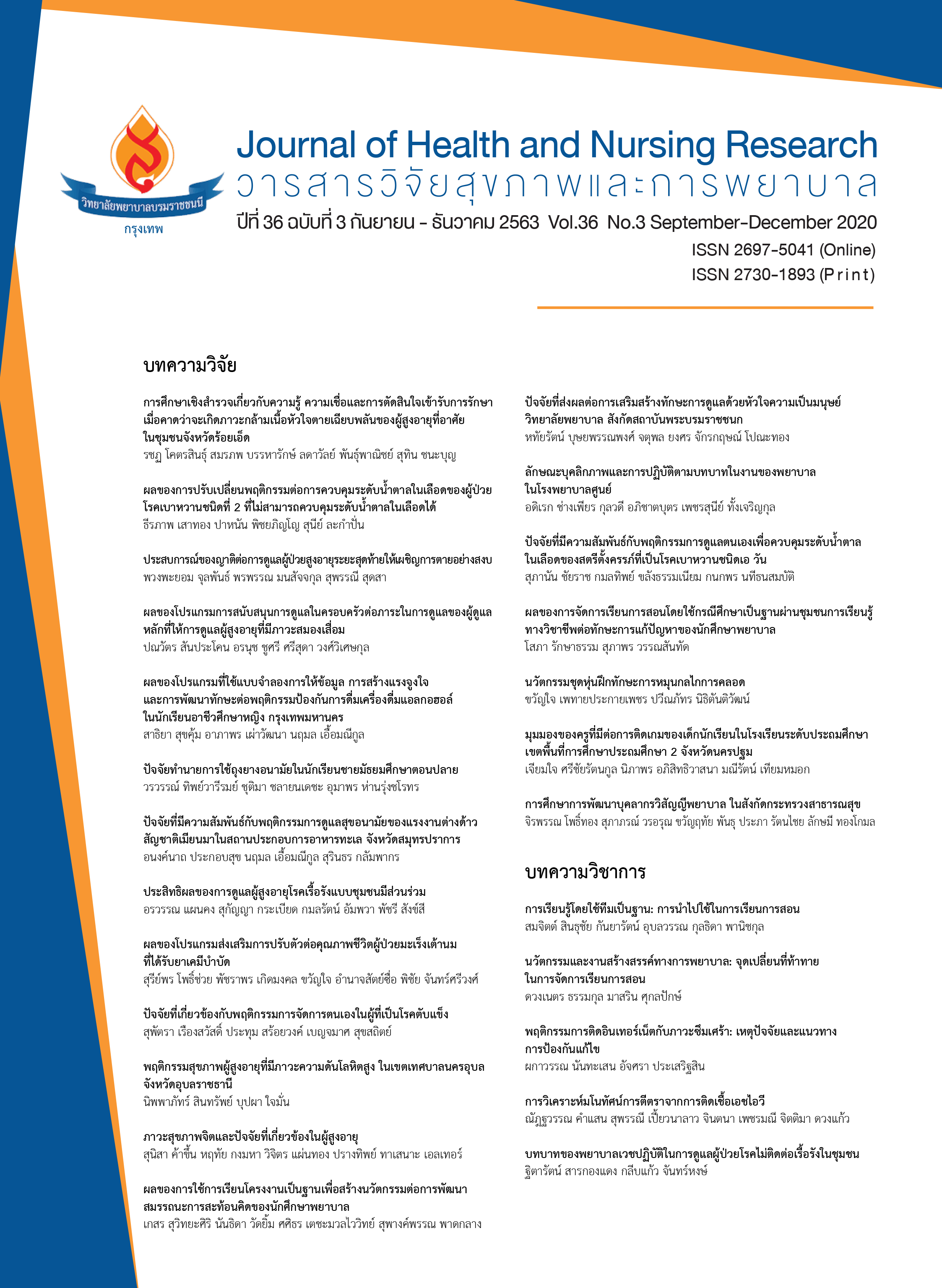ประสบการณ์ของญาติต่อการดูแลผู้ป่วยสูงอายุระยะสุดท้ายให้เผชิญการตายอย่างสงบ
คำสำคัญ:
การดูแล, การตายอย่างสงบ, ญาติ, ผู้ป่วยสูงอายุ, ผู้ป่วยระยะสุดท้ายบทคัดย่อ
ปัจจุบันผู้สูงอายุในประเทศไทยเจ็บป่วยด้วยโรคเรื้อรังและมีปัญหาด้านสุขภาพที่ซับซ้อนจากกระบวนการเปลี่ยนแปลงในวัยสูงอายุซึ่งสะท้อนถึงการมีคุณภาพชีวิตของผู้สูงอายุที่แปรผกผันกับการมีอายุขัยเฉลี่ยที่เพิ่มขึ้นโดยเฉพาะการที่ผู้ป่วยสูงอายุต้องเผชิญกับอาการในช่วงวาระสุดท้ายของชีวิต ครอบครัวของผู้ป่วยสูงอายุจำเป็นต้องรับมือกับกระบวนการตายที่เกิดขึ้นเพื่อให้ผู้ป่วยสูงอายุสามารถเผชิญกับความตายอย่างสงบและไม่ทุกข์ทรมาน ดังนั้นจึงมีความจำเป็นที่บุคลากรทางการแพทย์และสาธารณสุขควรเข้าใจญาติหรือสมาชิกในครอบครัวถึงการดูแลผู้ป่วยสูงอายุระยะท้ายเพื่อจะช่วยเตรียมความพร้อมในบทบาทผู้ดูแลผู้สูงอายุระยะสุดท้ายและส่งเสริมให้สมาชิกครอบครัวสามารถก้าวผ่านภาวะวิกฤตของครอบครัวไปได้ การวิจัยนี้มีวัตถุประสงค์เพื่อบรรยายประสบการณ์ของญาติต่อการดูแลผู้ป่วยสูงอายุระยะสุดท้ายให้เผชิญการตายอย่างสงบ ใช้ระเบียบวิจัยเชิงคุณภาพด้วยวิธีปรากฏการณ์วิทยาแบบตีความ คัดเลือกผู้ให้ข้อมูลแบบเจาะจงจำนวน 12 คน โดยเป็นญาติผู้ดูแลหลักของผู้ป่วยสูงอายุซึ่งได้รับการวินิจฉัยจากแพทย์ว่าเป็นโรคที่รุนแรงหรือโรคที่อยู่ในขั้นที่รักษาไม่หาย และเลือกกลับไปรักษาแบบประคับประคองที่บ้าน การวิเคราะห์ข้อมูลตามกระบวนการของ แวน แมนแนน (van Manen) ผลการศึกษาพบว่าประสบการณ์ของญาติต่อการดูแลผู้ป่วยสูงอายุระยะสุดท้ายให้เผชิญการตายอย่างสงบ อธิบายได้ 4 ประเด็น ได้แก่ 1) การเป็นผู้ตอบแทน หมายถึง ได้ตอบแทนสิ่งที่มีคุณค่าต่อผู้สูงอายุ 2) การเผชิญหน้ากับอุปสรรคและแก้ปัญหา หมายถึง ได้ต่อสู้กับความหวาดกลัวที่เกิดขึ้น 3) การรู้ซึ้งถึงการมีชีวิตอยู่ หมายถึง ได้อยู่ร่วมกันในวาระสุดท้ายของผู้สูงอายุ และ 4) การก้าวข้ามความรู้สึกผิด หมายถึง ได้รับมือต่อความสูญเสียที่เกิดขึ้น จากผลการศึกษานี้อาจใช้เพื่อเป็นแนวทางพัฒนาระบบการดูแลผู้ป่วยสูงอายุระยะสุดท้ายและสนับสนุนให้ญาติหรือสมาชิกครอบครัวได้รับการดูแลอย่างเหมาะสมเพื่อส่งเสริมการมีคุณภาพชีวิตของผู้ป่วยสูงอายุระยะสุดท้ายให้เผชิญการตายอย่างสงบได้
Downloads
เอกสารอ้างอิง
2. Sasat S. Gerontological nursing common problems and caring guideline. 3rd edition. Bangkok: Chulalongkorn University Press; 2011. (in Thai).
3. Quandt SA, Reynolds T, Chapman C, Bell RA, Grzywacz JG, Ip EH, et al. Older adults’ fears about diabetes: using common sense models of disease to understand fear origins and implications for self-management. Journal of Applied Gerontology 2013; 32(7):783-803.
4. Foundation of Thai Gerontology Research and Development institute. Situation of the Thai Elderly 2016. Bangkok: Printery Co; 2016 (in Thai).
5. Tongprateep T. Nurse: being with the dying. Bangkok: Chulalongkorn University Press; 2009. (in Thai).
6. WHO. WHO Definition of Palliative Care. [Internet]. 2012 [cited 2018 Dec 10] Available from. http://www.who.int/cancer/palliative/definition/en/
7. Pairojkul S. Criteria for diagnosis of the terminal stage of patient's illness. Khon Kaen: Faculty of Medicine; 2010. (in Thai).
8. Nursing Division, Office of Permanent Secretary. A palliative nursing service system. Bangkok: Suetawan publishing; 2016. (in Thai).
9. Department of Medical Services. Guidelines in the care of terminally ill patients. [Internet]. 2014 [cited 2020 June 1] Available from. https://www.skko.moph.go.th/dward/document_file/perdev/common_form_upload_file/20150316154846_2129601774.pdf. (in Thai).
10. Prapakorn S, Ssuayping S, Sookkhung A, Naewvong S, Punaram W, Foongfaung S. Development of palliative nursing service system for cancer patients receiving treatment at National Cancer Institute. Journal of Nursing Division 2015;42(3):53-68. (in Thai).
11. Horrigan-Kelly M, Millar M, Dowling M. Understanding the key tenets of Heidegger’s philosophy for interpretive phenomenological research. International Journal of Qualitative Methods 2016;15(1): 1-8.
12. Supapidhayakul S. Study and research using phenomenology. Journal of Research Methodology 1989; 4(1): 9-20 (in Thai)
13. Polit D F, Beck C T. Nursing research: Generating and assessing evidence for nursing practice. 9th ed. Philadelphia, PA: Wolters Kluwer Health/Lippincott Williams & Wilkins; 2012.
14. Van Manen M. Researching Lived Experience: Human Science for an Action Sensitive Pedagogy. New York: State University of New York Press; 1990.
15. Graneheim U, Lundman B. Qualitative content analysis in nursing research: concepts, procedures and measures to achieve trustworthiness. Nurse Education Today 2004; 24(2):105–12.
16. Pereira HR. Rigour in phenomenological research: Reflections of a novice nurse researcher. Nurse Researcher 2012;19(3):16-9.
17. Kanchanachari O, Sirapo-ngam Y, Monkong S. Roles and needs of caregivers for patients with end of life in a specific setting for palliative care. Ramathibodi Nursing Journal 2017; 23(3): 328-43. (in Thai).
18. Kumkwan K, Chaiyawut P. Preparation of care givers to promote death, dignity, in patients with end-stage. Research Journal Phranakhon Rajabhat: Science and Technology 2016;11(2):125-38. (in Thai).
19. Phrateprattanasutee. Parental Care according to Buddhism. Princess of Naradhiwas University Journal of Humanities and Social Sciences 2014;1(2):65-74. (in Thai).
20. Yongpattanajit S, MonKong S. Caregivers’ Stress and Coping with Stress from Caring for Terminally ill in Patients in a Palliative Care Unit. Journal of Nursing Council, 2020; 35(2):116-31. (in Thai).
21. Thongborisut C, Suyachai P. Adaptation in Crisis Situations of Life. Journal of MCU Humannities Review 2015;1(2):23-32. (in Thai).
22. Roy C, Andrews HA. The Roy adaptation model. 2nd edition. Stamford: Appleton & Lange; 1999.
23. Phasukwiharadham P, Saengsai P. Death: Truth, Value and benefits through Buddhist view. Dhammathas Academic Journal 2018;18(3):281-93. (in Thai).
24. Charuchinda V, Decreasing the Death Anxiety Using Buddhist Psychology 2018;3(1):1-12. (in Thai).
25. Meecharoen W. Family Caregivers of Cancer Patients: Roles’ Adaptation and Quality of Life Promotion. Ramathibodi Nursing Journal 2014;20(1):10-22. (in Thai).
26. Wattanatornnan S. Grief and Bereavement: The Nursing Role. Thai Red Cross Nursing Journal 2017;10(1):13-21. (in Thai).
27. Artsanthia J, Pomthong R. Nurses’Role: Case Study of Psychological Care for Caregivers of Patients with Terminal Illness. Journal of The Royal Thai Army Nurses 2018;19(1): 1-8. (in Thai).
ดาวน์โหลด
เผยแพร่แล้ว
รูปแบบการอ้างอิง
ฉบับ
ประเภทบทความ
สัญญาอนุญาต
บทความที่ได้รับการตีพิมพ์ เป็นลิขสิทธิ์ของวารสารวิจัยสุขภาพและการพยาบาล (วิทยาลัยพยาบาลบรมราชชนนี กรุงเทพ) ไม่สามารถนำไปตีพิมพ์ซ้ำในวารสารฉบับอื่น


















